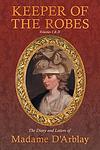Fanny Burney
Fanny Burney, also known as Frances Burney and later as Madame d’Arblay, was an English satirical novelist, diarist, and playwright. She was born on June 13, 1752, in King's Lynn, Norfolk, England, and died on January 6, 1840. Burney is best known for her novels 'Evelina' (1778), 'Cecilia' (1782), 'Camilla' (1796), and 'The Wanderer' (1814). Her works are credited with influencing notable authors such as Jane Austen and William Makepeace Thackeray. Burney's diaries and letters, published posthumously, provide a rich account of English society in the late 18th and early 19th centuries.
Books
This list of books are ONLY the books that have been ranked on the lists that are aggregated on this site. This is not a comprehensive list of all books by this author.
-
1. Evelina
The novel follows the journey of a young, naive girl named Evelina as she navigates the complex societal norms of 18th-century England. Raised in rural obscurity, Evelina's life changes dramatically when she enters London's high society. She must learn to navigate the treacherous waters of social etiquette, romantic interest, and the dangers that come with being a beautiful, young woman in a world dominated by men. Throughout her journey, Evelina struggles to maintain her virtue and innocence while dealing with the advances of various suitors, providing a humorous and satirical look at the gender dynamics and social conventions of the time.
-
2. Camilla
Camilla, a young woman, navigates through the trials and tribulations of love, family, and society in 18th century England. Her journey is filled with misunderstandings, mistaken identities, and the complexities of human emotions. Throughout the story, she must grapple with her love for a man who is unaware of her feelings, her responsibility towards her family, and the expectations of society. The novel explores themes such as the importance of virtue, the pitfalls of vanity, and the complexities of human relationships.
-
3. The Diary of Fanny Burney
"The Diary of Fanny Burney" is a collection of personal entries by a prominent English novelist and playwright from the late 18th and early 19th centuries. The diary provides a unique perspective on the social and literary life of England during this period, with Fanny Burney's observations on the people and events around her. It offers intimate glimpses into her relationships with notable figures such as Samuel Johnson and King George III, as well as her own struggles with her writing career and personal life.


